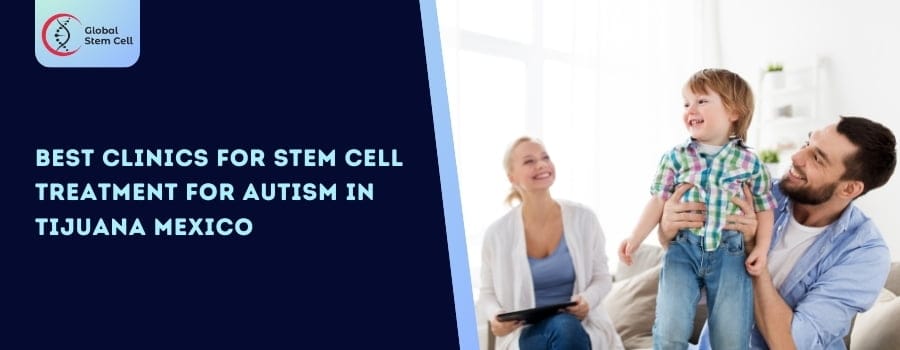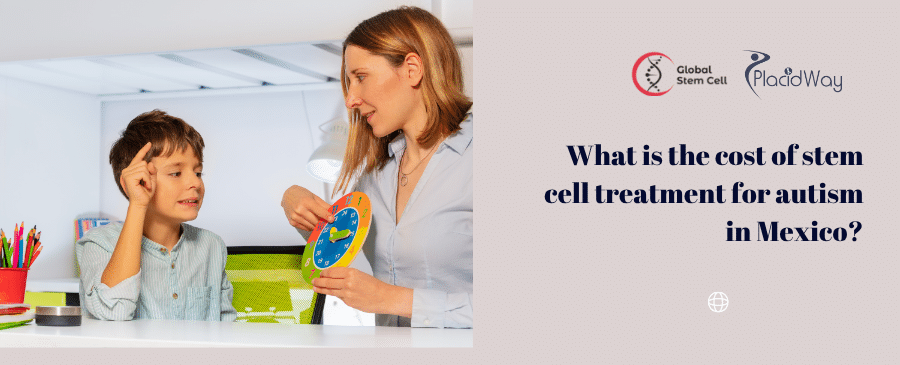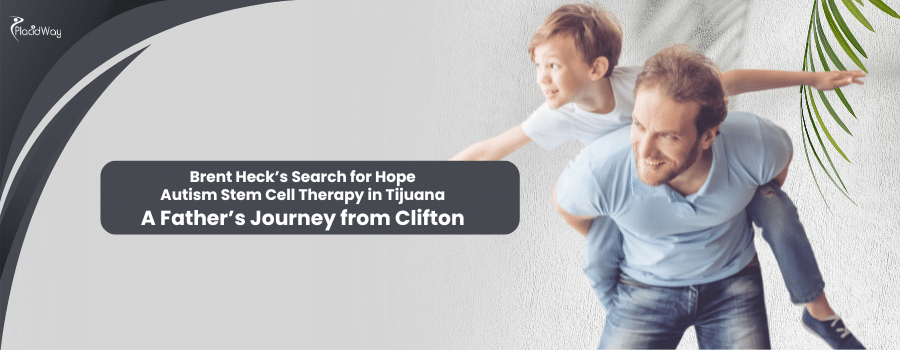
Stem cell treatment for autism in Tijuana, Mexico, is emerging as a promising option for families seeking innovative solutions to improve the quality of life for their loved ones. Autism Spectrum Disorder (ASD) presents numerous challenges, including difficulties with communication, behavior, and social interaction.
While traditional therapies have been the cornerstone of managing autism, stem cell therapy offers a new avenue of hope. In this blog post, we explore the benefits, process, and key considerations for seeking stem cell therapy for autism in Tijuana.
Table of Content
Understanding Stem Cell Therapy for Autism
Autism Spectrum Disorder (ASD) is a complex neurodevelopmental disorder characterized by challenges in communication, behavior, and social interaction. Traditional therapies such as behavioral interventions, speech therapy, and occupational therapy have been the mainstay treatments. However, stem cell therapy has emerged as a potential new avenue for treating autism. Here’s an in-depth look at what stem cell therapy involves and how it may benefit those with autism.
What is Stem Cell Therapy?
Stem cell therapy utilizes stem cells, which are undifferentiated cells capable of transforming into specialized cell types. These cells can regenerate and repair damaged tissues. There are various types of stem cells, but the ones most commonly used for autism treatment include:
- Mesenchymal Stem Cells (MSCs): These are derived from bone marrow, adipose (fat) tissue, or umbilical cord tissue. MSCs have anti-inflammatory and immunomodulatory properties, which can be beneficial in treating neuroinflammation associated with autism.
- Hematopoietic Stem Cells (HSCs): Found in bone marrow and peripheral blood, these stem cells are primarily responsible for forming blood cells but can also support immune system regulation.
- Neural Stem Cells (NSCs): These stem cells can differentiate into neurons and glial cells, potentially aiding in brain repair and regeneration.
How Does Stem Cell Therapy Work for Autism?
The exact mechanism by which stem cell therapy may benefit individuals with autism is still being researched, but the primary theories include:
- Secreting Growth Factors: Stem cells release various growth factors and cytokines that support tissue repair and regeneration, potentially aiding in the recovery of neural functions.
- Reducing Neuroinflammation: Chronic inflammation in the brain is believed to be a contributing factor in autism. Stem cells have anti-inflammatory properties that can help reduce this inflammation.
- Modulating the Immune System: Abnormal immune responses have been linked to autism. Stem cells can help regulate the immune system, potentially reducing the severity of autistic symptoms.
- Enhancing Neural Connectivity: Stem cells can promote the growth and repair of neural cells, improving brain function and connectivity, which may translate to better cognitive and social skills.
Leading Clinic in Tijuana for Stem Cell Therapy
Tijuana, Mexico, is a renowned destination for advanced medical treatments, including stem cell therapy. One of the leading clinics offering stem cell therapy for autism in Tijuana is ProgenCell. This clinic is known for its commitment to cutting-edge research, high standards of patient care, and comprehensive treatment protocols.
ProgenCell is a premier medical facility specializing in regenerative medicine and stem cell therapies. Founded by a team of dedicated medical professionals, ProgenCell aims to provide innovative treatments for various medical conditions, including autism.
Key Features of ProgenCell
- Expert Medical Team: ProgenCell boasts a team of highly qualified and experienced doctors, including specialists in regenerative medicine and stem cell therapy. Their expertise ensures that patients receive the best possible care and treatment outcomes.
- State-of-the-Art Facilities: The clinic is equipped with modern medical technology and adheres to international standards of safety and hygiene. This ensures that all procedures are performed in a safe and controlled environment.
- Personalized Treatment Plans: ProgenCell emphasizes personalized care. Each patient undergoes a thorough evaluation, and a customized treatment plan is developed based on their specific needs and medical condition.
- Comprehensive Care: From initial consultation to post-treatment follow-up, ProgenCell provides comprehensive care. Patients are closely monitored throughout the treatment process to ensure optimal results and address any concerns promptly.
The Treatment Process
- Initial Consultation and Assessment: A thorough medical evaluation is conducted to determine the patient’s suitability for stem cell therapy. This includes reviewing medical history, current symptoms, and previous treatments.
- Personalized Treatment Plan: Based on the assessment, a customized treatment plan is developed. This plan outlines the type of stem cells to be used, the number of sessions required, and additional supportive therapies.
- Stem Cell Administration: Stem cells are administered through intravenous (IV) infusion or intrathecal injection (into the spinal canal), depending on the treatment plan. The procedure is minimally invasive and usually completed in an outpatient setting.
- Post-Treatment Care: After the stem cell administration, patients are monitored for any immediate reactions. Follow-up appointments are scheduled to track progress and adjust the treatment plan as necessary.
Potential Benefits of Stem Cell Therapy for Autism
- Improved Communication Skills: Many patients experience enhancements in verbal and non-verbal communication.
- Reduced Behavioral Issues: Stem cell therapy may help mitigate aggressive behaviors, hyperactivity, and repetitive actions.
- Enhanced Social Interaction: Patients often show better engagement and responsiveness in social settings.
- Cognitive Improvements: Some patients report improvements in attention span, learning ability, and overall cognitive function.
Why Choose Tijuana for Stem Cell Therapy?
Tijuana, Mexico, has become a prominent destination for individuals seeking advanced medical treatments, including stem cell therapy. The city offers several advantages that make it an attractive option for patients from around the world. Here are some key reasons why Tijuana is an ideal choice for stem cell therapy:
1. Proximity to the United States
Tijuana is located just south of the U.S.-Mexico border, making it easily accessible for patients from the United States and Canada. Its close proximity allows for convenient travel, often requiring just a short drive from major cities in Southern California. This accessibility reduces travel time and costs, making it a practical option for many patients.
2. High-Quality Medical Facilities
Tijuana is home to numerous state-of-the-art medical facilities that adhere to international standards of safety and quality. These facilities are equipped with modern technology and offer a wide range of medical services, including cutting-edge stem cell therapies. Many clinics in Tijuana are accredited by international health organizations, ensuring that patients receive high-quality care.
3. Experienced and Qualified Medical Professionals
The medical professionals in Tijuana are highly trained and experienced in stem cell therapy and regenerative medicine. Many doctors and specialists have received their education and training in the United States or other countries with advanced medical education systems. Their expertise ensures that patients receive effective and safe treatments.
4. Cost-Effective Treatment Options
One of the most significant advantages of seeking stem cell therapy in Tijuana is the cost savings. Medical treatments in Tijuana are often more affordable than in the United States and other countries. This cost-effectiveness extends to stem cell therapy, where patients can receive high-quality treatment at a fraction of the cost they would incur in their home countries. Lower costs do not equate to lower quality; rather, they are a result of the overall lower cost of living and operating expenses in Mexico.
5. Comprehensive Care and Personalized Treatment Plans
Clinics in Tijuana offer comprehensive care, including personalized treatment plans tailored to each patient’s specific needs. From the initial consultation and assessment to post-treatment follow-up, patients receive individualized attention and care. This personalized approach ensures that the treatment is as effective as possible and addresses the unique aspects of each patient’s condition.
6. Advanced Research and Innovative Treatments
Tijuana is at the forefront of medical research and innovation, particularly in the field of regenerative medicine. Many clinics in the city are involved in ongoing research and clinical trials, continually improving and refining their treatment protocols. This commitment to innovation ensures that patients have access to the latest and most effective treatments available.
FAQs
How long does it take to see results?
The timeline for seeing results can vary. Some patients may notice improvements within a few weeks, while others may take several months. The effectiveness of the therapy can depend on various factors, including the severity of the condition and individual patient response.
How much does stem cell therapy for autism cost in Tijuana?
The cost of stem cell therapy in Tijuana is generally more affordable than in the United States and other countries. Prices can vary based on the clinic, the type of stem cells used, and the specific treatment plan. It’s advisable to contact the clinics directly for detailed pricing information.
How can I choose the right clinic in Tijuana?
When choosing a clinic, consider factors such as:
- The clinic’s reputation and track record
- Qualifications and experience of the medical professionals
- Patient testimonials and success stories
- Accreditation and adherence to international standards
Are there age restrictions for stem cell therapy for autism?
Stem cell therapy can be considered for patients of various ages, from children to adults. The suitability of the therapy will depend on the individual’s specific condition, medical history, and overall health. It’s important to discuss age-related considerations with the clinic during the initial consultation.
Can international patients receive stem cell therapy in Tijuana?
Yes, many clinics in Tijuana cater to international patients and provide services to help with travel arrangements, accommodation, and language translation if needed. Tijuana’s proximity to the U.S. border makes it a convenient location for international patients seeking advanced medical treatments.
How do I evaluate the success of stem cell therapy for autism?
The success of stem cell therapy can be evaluated through various measures, including:
- Improvements in communication and social interaction skills
- Reduction in behavioral issues and repetitive actions
- Enhanced cognitive functions and learning abilities
- Overall quality of life improvements for the patient and their family
Discover the transformative potential of stem cell therapy for autism in Tijuana. Contact us today to schedule your consultation and start your journey towards improved quality of life for your loved one.





